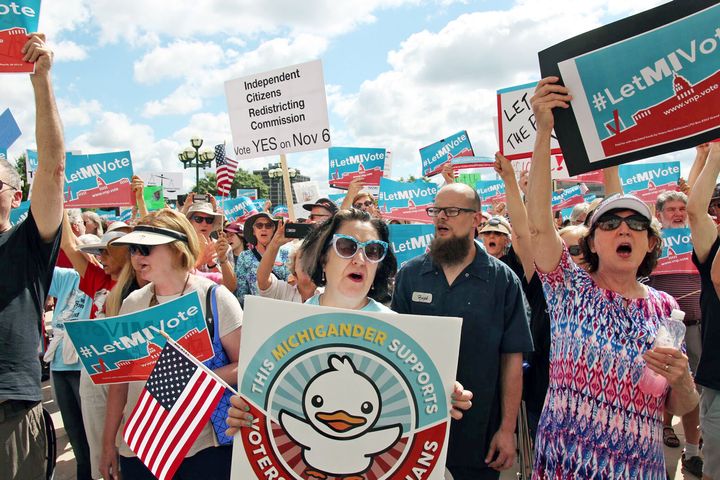A proposal to create an independent 13-member redistricting commission will appear before Michigan voters in November, the state’s highest court ruled late Tuesday.
In a 4-3 decision, the Michigan Supreme Court ruled that voter-initiated amendments can appear before voters as long as they do not “significantly alter or abolish the form or structure of our government, making it tantamount to creating a new constitution.”
The independent redistricting proposal brought by Voters Not Politicians “surpasses these hurdles and is a permissible voter-initiated amendment,” Justice David Viviano, writing for the majority, said in the opinion.
Michigan is often cited as one of the most gerrymandered states in the country, where Democratic voters are packed in Detroit and Ann Arbor.
While the ballot initiative will appear before voters, this is just the first hurdle cleared by the pro-redistricting campaign. The redistricting ballot initiative is ripe territory for out-of-state funding and dark money campaigns trying to influence voters in a politically crucial state.
An independent redistricting commission could have serious implications for the the political landscape of the country given that Michigan is a swing state and the proposal would require Michigan’s congressional and legislative districts to be redrawn. The Trump campaign spent millions in get-out-to-vote initiatives in Florida, Michigan, Wisconsin and Pennsylvania in the final days of the 2016 elections, states that secured Trump the Oval Office. Trump won Michigan in 2016 by 10,700 votes, a state President Barack Obama won in 2012 by 9.5 percentage points.
Lawyers for Citizens Protecting Michigan’s Constitution, the opposition campaign primarily funded by the Michigan Chamber of Commerce, filed a lawsuit in April arguing that the ballot initiative to create an independent redistricting commission warranted a revision of the state’s constitution rather than an amendment presented to Michigan voters in November.
In June, the Michigan Court of Appeals rejected the lawsuit, prompting an appeal to the state’s highest court.
The Michigan Chamber of Commerce on Wednesday said it was “disappointed” in the decision.
“Unfortunately, Michiganders are now left to wonder what the rules are for future petition drives and ballot proposals,” Chamber President and CEO Rich Studley said in a statement. The Chamber will “take no further legal action regarding this ballot proposal,” said Jim Holcomb, executive vice president and general counsel for the Michigan Chamber.
Efforts to reach the Michigan Chamber of Commerce for additional comment was unsuccessful.
Meanwhile, the lawyers for Voters Not Politicians, the campaign advocating for the ballot initiative, disputed the opposition’s argument, saying that the ballot initiative should be an amendment to the state’s constitution because it’s sole purpose is to reform the way congressional and legislative districts are drawn.
“Our state Constitution begins with, ‘All political power is inherent in the people.’ The court’s decision upholds our right as citizens to petition our government for positive change,” said Katie Fahey, the founder and executive director of Voters Not Politicians.
In the majority opinion, Viviano noted that the case has “broad significance” for residents of the state and the constitutional limitations on the power they have to put forward voter-initiated amendments.
“It is not a judge’s role to philosophize a theory of government. Rather, we are stewards of the people and must faithfully abide by the decisions they make through the laws they adopt. We accomplish this by adhering to the plain meaning of the text of those laws. Here, that approach leads us to conclude that a voter-initiated amendment… is permissible,” Viviano wrote.
Viviano was joined in the opinion by fellow Republican appointee Elizabeth Clement—who is up for re-election and has received the endorsement of the Michigan Chamber of Commerce— and Democratic-nominated Justices Bridget McCormack and Richard Bernstein.
In a sharply worded dessent, Chief Justice Stephen Markman said the ballot initiative would create the establishment of a “super-administrative” commission to “to carry out the foundational role of self-government” and would affect the “foundation power” of government.
“The VNP proposal would affect the ‘foundation’ power of government by removing altogether from the legislative branch authority over redistricting and consolidating that power instead in an ‘independent’ commission made up of 13 randomly selected individuals who are not in any way chosen by the people, representative of the people, or accountable to the people,” Markman wrote. “This, in my judgment, reflects a fundamental alteration in the relationship between the people and their representatives.”
Markman was joined in the dissent by Justices Brian Zahara and Kurtis Wilder, who is also up for re-election. All three men were initially appointed to the bench by Republican governors.
Markman’s campaign has received at least $124,000 since 1998 from the Michigan Chamber of Commerce, affiliated groups, and individuals, including nearly $31,000 in campaign contributions from the chamber’s PAC. Zahra’s campaign has received more than $122,000 from the chamber and affiliated groups and individuals. The Michigan Republican party has donated more than $60,000 to Markman’s campaign and nearly $166,000 to Zahara, according to Sludge’s analysis of campaign contributions.
Since Supreme Court justices first need to be nominated at the state GOP convention on August 25, Wilder and Clement do not need to file campaign finance disclosures for another few weeks. Clement’s campaign did not respond to request for comment on whether there are concerns that she won’t get the party’s endorsement at the convention. Wilder’s campaign did not immediately respond to emails seeking comment.
While Republicans have denied their involvement in gerrymandering the state, privately they’ve boasted about their involvement in creating the district lines to disadvantage Democrats, emails that emerged as part of a separate lawsuit filed by the League of Women Voters of Michigan show.
A spokeswoman for the Michigan Republican party did not immediately return a call asking whether the party would be campaigning against the ballot initiative or whether it would decline to support Clement.
Despite Democrats winning more than half of the votes for the Michigan House in 2016, Republicans won the most seats. Michigan Republicans, who drew the district lines in 2010, have continually denied allegations of partisan gerrymandering involving the state’s 14 congressional districts, nine of which are held by Republicans.
An aide to former Michigan Rep. Thaddeus McCotter flaunted in an email about packing “Dem garbage” in four southeast Michigan congressional districts.
“In a glorious way that makes it easier to cram ALL of the Dem garbage in Wayne, Washtenaw, Oakland and Macomb counties into only four districts,” aide Jack Daly wrote in 2011. “Is there anyone on our side who doesn’t recognize that dynamic?”
In a separate email from 2011, longtime Michigan Chamber of Commerce executive, Robert LaBrant, predicted that the newly drawn district maps would keep Republicans in power for years and implied that the 4th congressional district was drawn at the request of former Rep. Dave Camp, the former chairman of the House Ways and Means Committee who retired in 2015.
“We will accommodate whatever Dave wants in his district,” said LaBrant, who has since left the Chamber of Commerce and is now a Republican consultant. “We’ve spent a lot of time providing options to ensure we have a solid 9-5 delegation in 2012 and beyond.”
The campaign surrounding the fate of the ballot initiative has been marred with potential conflicts of interest. Since justices are elected to serve on the Michigan Supreme Court, they take in campaign contributions from organizations and people that may have business before the court.
A Sludge analysis of campaign contributions stemming back two decades, found that the Michigan Chamber of Commerce and affiliated groups and individuals have given roughly $336,000 to sitting members of the Michigan Supreme Court. That figure includes contributions from the Chamber and former employees, along with businesses that are members of the Chamber, employees who work for an company that is a member, and companies and people that have donated to Citizens Protecting Michigan’s Constitution.
The campaign treasurer for Clement and Wilder, as well as several other justices, is married to Eric Doster, one of the lawyers leading the opposition to the ballot initiative.



